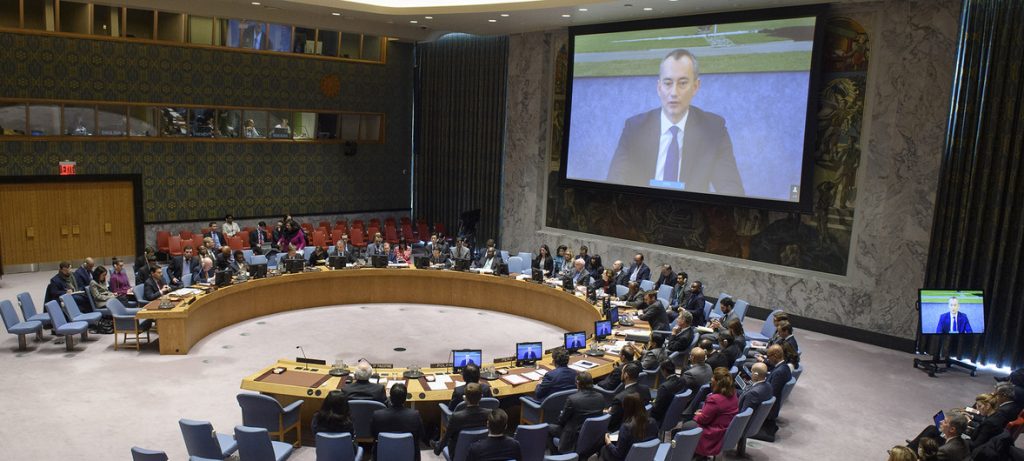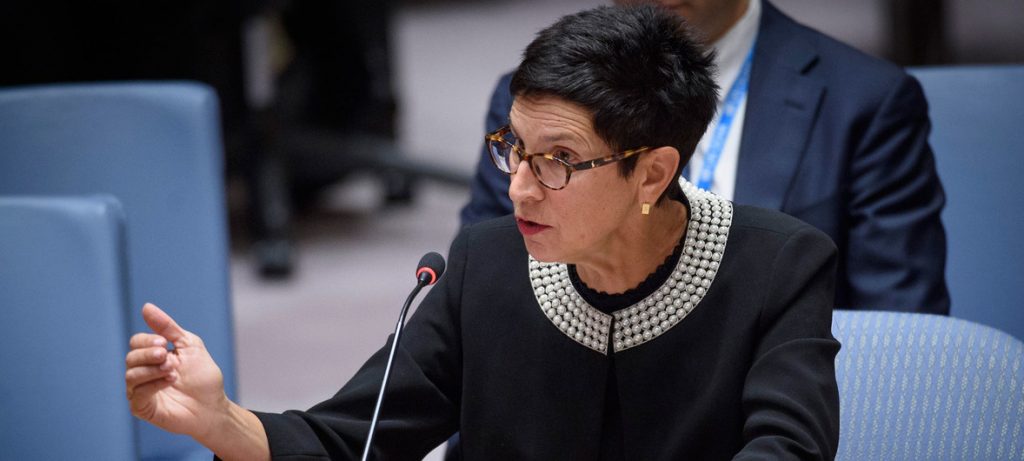
Nickolay Mladenov (on screen), UN Special Coordinator for the Middle East Peace Process, briefs the Security Council on the situation in the Middle East, including the Palestinian question. (file)
The spectres of violence and radicalism in the Occupied Palestinian Territory are growing, and the prospect of sustainable peace is fading by the day, a senior UN envoy in the region told the Security Council on Wednesday.
The Council was briefed by Nickolay Mladenov, Special Coordinator for the Middle East Peace Process, as well as Ursula Mueller, Assistant Secretary-General for Humanitarian Affairs.
In a sombre assessment, Mr. Mladenov characterized the hope of a peaceful two-state solution as “slim.” Extremists are on the rise and that the risk of war looms large, he explained.
Against this backdrop, the immediate challenge is the prevention of an economic and humanitarian implosion in the West Bank and Gaza.
The Palestinian people, he continued, need the support of the international community more than ever, as a range of issues are exerting a “heavy toll” on those living in Gaza and the West Bank. These include ongoing violence, the lack of progress towards peace, financial pressures and unilateral measures by the Government of Israel.
Mr. Mladenov cited a recent decision by Israel to withhold some $140 million in Palestinian tax revenue transfers (the equivalent of money paid to Palestinians convicted of terrorism or security-related offences, and their families), and the decision of the United States Government to halt funding for the UN Relief and Works Agency for Palestine Refugees (UNRWA) as factors driving financial instability in the Occupied Palestinian Territory.
Ms. Mueller also described the “rising vulnerability” of Palestinians in Gaza, with salaries for public sector employees reduced or withheld, including in the health and education sectors, unemployment at over 50 per cent, and the fact that most citizens are dealing with food insecurity.
Funding cuts have forced the World Food Programme (WFP) to suspend assistance to some 27,000 people and reduce rations to another 166,000 beneficiaries. There is still, she continued, a considerable funding gap, and she urged Member States to step up and increase their support for humanitarian operations.
A number of political steps, said Mr. Mladenov, are necessary for the establishment of peace, including an end to the designation of land for exclusively Israeli use, as well as the cessation of Israeli settlement construction and expansion, and the creation of opportunities for Palestinian development in the West Bank. Demolitions and seizures of Palestinian-owned structures have continued across the West Bank, with some 900 Palestinians in East Jerusalem facing eviction.
The Special Envoy condemned violence and terror in the region over the past few months, which has seen the deaths of 40 children killed by Israeli forces, and the firing of 18 rockets towards Israel by Palestinian militants. There has been an upsurge in settler violence over the past year, he reported, with 20 recorded incidents of Israeli settlers injuring Palestinians or damaging their property.
The casualty figures are “stretching the capacity of health care providers” in the territory, said Ms. Mueller, putting the entire system at the risk of collapse: “Since the start of demonstrations in March 2018, over 27,000 Palestinians have been injured, more than 6,000 of them by live ammunition. According to the World Health Organization (WHO), 122 amputations have taken place since the start of the mass demonstrations, including 21 paediatric amputations.”
An international community committed to supporting both parties, leadership, and political will for change are, contended Mr. Mladenov, of primary importance and, until they are found, “Palestinians and Israelis will continue to slide into increasingly hazardous territory.”
